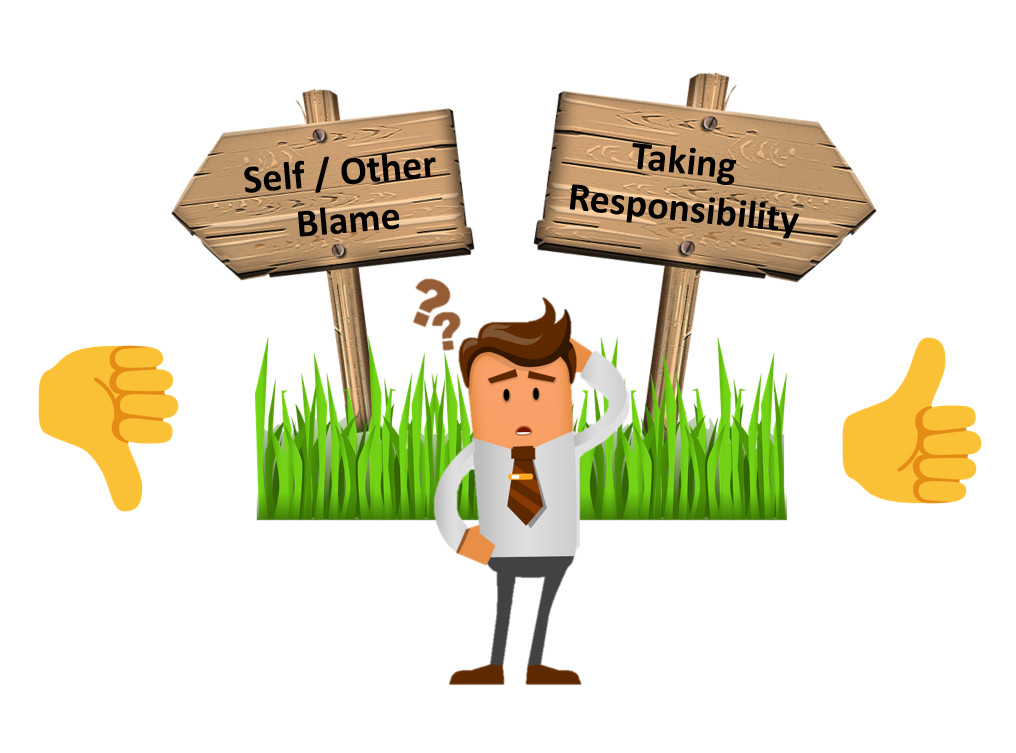How is self-blame different from taking responsibility?

Blaming the other person for any problem is easily understood as different from taking responsibility. The difference is simple and clear. Having said that, many a times we blame ourselves and we assume that we are taking responsibility. Self-blame is very different from taking responsibility.
Here are a few questions to ask yourself to understand how much you blame or criticize your own self.
1. What’s your immediate thought or inner voice you hear when you make a mistake?
Neeta was rushing with her father to attend a friend’s marriage because she was late. On top of that she forgot to take the gift from her home, which she realized 10 minutes after leaving the house. They had to drive back home to pick up the gift. She was furious with herself, and couldn’t stop telling herself how stupid she was, to have forgotten the gift. Neeta had a pattern of forgetting important things when she was travelling.
2. What do you tell yourself in a difficult situation that is beyond your control?
Raj’s father had a heart attack and was admitted to the hospital. Raj couldn’t stop blaming himself or not having him get a health check-up earlier and that he should have seen this coming and that he was a bad son to have let this happen.
3. Do you blame yourself for the other person’s behaviour or even emotions?
Ajay came home from the office in a bad mood. And he has a tendency and history of violent behaviour. His three year old daughter wanted him to play with her and hence kept asking him so. He became very angry shouted at his daughter and stormed out of the house. Shweta his wife blamed herself for not stopping her daughter.
4. Do you blame yourself to do nothing about the situation?
Rakesh again forgot to buy medicines for Deepa. When Deepa got upset about it, he blamed himself saying I am such a lousy person and what can I do about it? I am so bad a person that your life is getting spoilt with me. Deepa had to console him and convince him that he is not a bad person.
Blaming self doesn’t result in solving the issue at hand
If you look at each of these scenarios, the action of blaming themselves didn’t result or contribute in solving the issue at hand, it made them feel worse and disempowered. The situation remained the same or became worse.
| Self Blame | Taking Responsibility |
| There is no affirmative action to solve the issue | There is an affirmative action to solve the issue |
| The person feels disempowered | The person feels empowered |
| Critical voice | Compassionate voice |
| Fear, shame, guilt | Healing, learning, growth |
| Does not result in any change in the person or situation | There is a learning in the person or a solution to the situation |
| Stay stuck in the problem. Unhealthy coping strategies | Move ahead towards a solution. Deal with the problem or learn to cope adaptively |
| The person feels demotivated and de-energized | The person feels motivated and energized |
In the scenarios listed above, how would it be if they were to take responsibility instead of self-blame.
Neeta reflects on why she forgets important things especially when she was travelling. She decides to make a list of things to take whenever she travels. She also decides to ensure that she is ready to leave 10 minutes in advance. And check the list she made to ensure that forgetting things doesn’t happen again.
Raj takes good care of his father. He accepts that there are things that are inevitable and will happen. He ensures that his father gets the best of care and schedules regular check-ups going forward.
Shweta realizes that Ajay’s violent behaviour, shouting etc are abusive in nature. She confronts him and tells him that she will leave him with her daughter if he doesn’t mend his ways and stops the abuse. She asserts herself and takes the support of her friend a lawyer to get protection for herself and her daughter.
Deepa doesn’t console Rakesh but tells him that if he really feels remorse for forgetting her medicines, the he should learn to not forget them and do what he promises to do. She refuses to buy his “poor me” story and holds him accountable. Rakesh realizes that he cannot escape his responsibilities by self-blame and that it would not be bought by Deepa.
Though self blame and responsibility might seem similar they are as different as chalk and cheese.
Taking responsibility is a process of personal growth and accounting for one’s own self, others and the situation. Self blame or other blame is a process of discounting self or the other respectively and leads to stagnation in life.
Counselling or therapy could be a safe space for you to move from a space of self-blame to taking responsibility. The therapist could gently facilitate your awareness as to how it came to be this way and to explore ways of effecting the shift towards a more aware and empowered life.
About the Author:
Kala Balasubramanian is a certified Counselling Psychologist and Psychotherapist with a Masters in Counselling and Psychotherapy, Diplomas in Counselling and has further certifications specializing in couple/marriage/relationship counselling and family counselling. As a trained therapist, she provides professional and confidential counselling services including Individual counselling and Couples counselling / Marriage counselling.
Currently with the COVID-19 situation, all counselling services are offered online over video calls. Reach us at +91 9632146316 or write to us at counselor@innerdawn.in.
